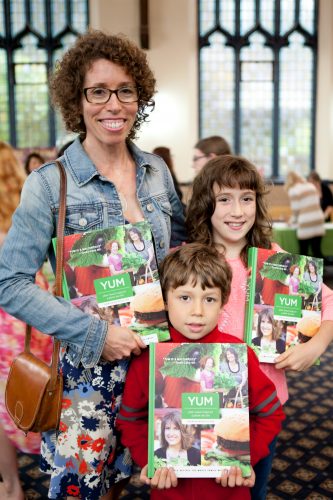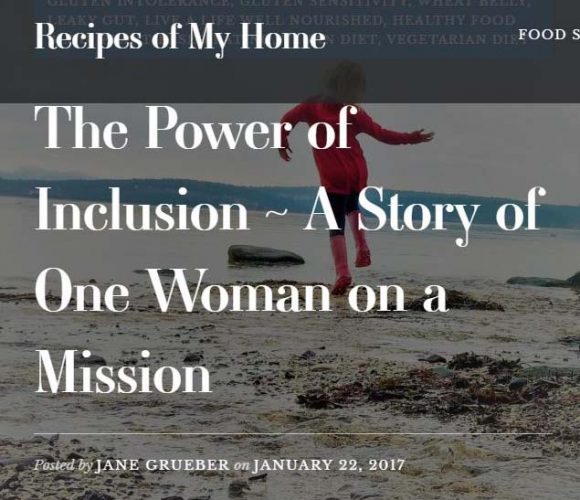“Inclusive Cooking” is a new paradigm and philosophy that I developed to encourage a more heart-centred, generous and emotionally-sensitive approach to food sharing in society. Eating is inherently an emotional experience, strongly impacted by our attachment experiences and sense of inclusion (or lack thereof). Because of this, depending on one’s complex experiences and associations around food, it is common to discover a great deal of psychological suffering, social isolation, and even physical health impairment that has not yet been adequately addressed. With the awareness of this reality, coupled with the conscious decision to reduce negative patterns through a large-scale mind-set and behavioural shift, I believe that it is possible to co-create a culture of greater inclusion, compassion and kindness.
“Eating is inherently an emotional experience, strongly impacted by our attachment experiences and sense of inclusion (or lack thereof).”
~ Dr. Theresa Nicassio
As reported in simple language in a recent LA Times article, The Journal of the American Medical Association (JAMA. 2015;314(10):1021-1029. doi:10.1001/jama.2015.10029) has estimated that about half of the US population (49-52%) is diabetic or pre-diabetic. In addition to this sobering information, we also know that the youth diabetes and obesity rates are on the rise. It is clear that the time has come for us to take a serious look at what is underlying these trends with a new and more compassionate lens. Psychologists who have expertise in the area of attachment and relationally-based psychology (especially those who understand the complex nature of the mammalian relationship with food, feeding and survival) are most equipped to address this health crisis that we are currently facing in our society.
The Journal of the American Medical Association has estimated that about half of the US population (49-52%) is diabetic or pre-diabetic.
~ Dr. Theresa Nicassio
Many people describe themselves and others as “emotional eaters”. The truth is, every person who resides on the planet is an emotional eater! When you think about how a simple little bell associated with food made Pavlov’s dogs salivate, imagine all of the complex associations we develop in our lifetimes around food and feeding!!! It’s time that we stop the psychological battering of making ourselves and each other feel badly about our emotional relationship with food. Instead, we have the opportunity to acknowledge and work with the reality of the challenges before us together in more responsible, nurturing and creative ways. Doing so will not heal all the current problems associated with food and health, especially given the chemical and biological nature of the artificially engineered foods (many with strongly addictive qualities) that have overtaken our food supply (another important topic that I will save for others to take on). However, addressing some of the questionable associations and behaviours around food that have become normative is an important place to start.
“The truth is, every person who resides on the planet is an emotional eater!”
~ Dr. Theresa Nicassio
Because eating is by nature an emotional process that connects us with ourselves, each other and our world, the more  inclusive we can make the experience, the more cared about and part of the community everyone can feel. With the increase in dietary restrictions that are the result of health needs and/or philosophical preferences, the dynamic of judgement and exclusion around eating has become more pronounced. Unfortunately, many troubling attitudinal and behavioural adaptation patterns have taken root along the way—patterns that are causing more harm than good.
inclusive we can make the experience, the more cared about and part of the community everyone can feel. With the increase in dietary restrictions that are the result of health needs and/or philosophical preferences, the dynamic of judgement and exclusion around eating has become more pronounced. Unfortunately, many troubling attitudinal and behavioural adaptation patterns have taken root along the way—patterns that are causing more harm than good.
The great news is that there are lots of ways we can make the food we eat more accessible to more people. By doing so, we are able to single-handedly as individuals, and collectively as a society help each other in a profoundly meaningful way. The hardest part is allowing ourselves to be open to thinking about food differently and taking on the challenge of changing our well-established (and culturally-entrenched) habits. This is no small matter, since changing our habits is one of the most difficult things we can ever do—especially for sustained periods of time (as the millions of failed “New Year’s Resolutions can easily attest to).
The great news is that there are lots of ways we can make the food we eat more accessible to more people….The hardest part is allowing ourselves to be open to thinking about food differently and taking on the challenge of changing our well-established (and culturally-entrenched) habits.
~ Dr. Theresa Nicassio
While many don’t realize it, gone are the days when eating food that has no sugar, gluten, dairy, potatoes or eggs (as well as many other common allergens) needs to be difficult or lacking in flavour. As a psychologist, I understand how difficult habit change can be. Combining this knowledge with my own personal health challenges and learnings, I have decided to apply my culinary skills as a chef to good use. It is my hope that others will similarly bring their gifts to the table and join in this paradigm-shifting food revolution of inclusion. In so doing, we can all practice inclusive cooking to create food that honours the unique needs of those we love and want to serve—not just physically, but emotionally as well. ![]()
Dr. Theresa Nicassio (The Inclusive Chef) is a registered psychologist (#1541) and author of YUM: plant-based recipes for a gluten-free diet (Sept 2015).
“Frankly, YUM was my first plant-based cookbook. It was the first time (or the first time in a very long time) reading a bold message of inclusivity in any genre; a book that overtly stated the intention of including people who might otherwise be excluded or marginalized, such as those who suffer from disease, food allergies or food sensitivities.”
– Jane Grueber, Author of “Recipes of My Home”
from “The Power of Inclusion ~ A Story of One Woman on a Mission”
Using Food to Experience Kindness and Inclusivity
Karen Donaldson Interviews Dr. Theresa Nicassio
EFT Radio: Transformational Techniques for Self-Healing & Peak Performance
“The Power of Inclusion ~ A Story of One Woman on a Mission”
on



